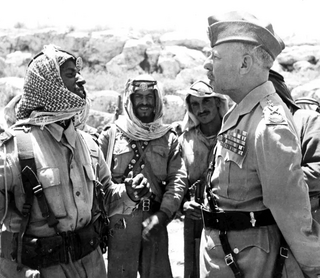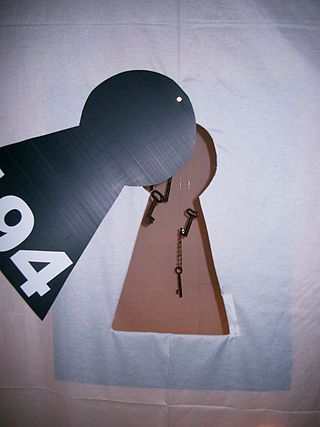
The 1948 Arab–Israeli War, also known as the First Arab–Israeli War, followed the civil war in Mandatory Palestine as the second and final stage of the 1948 Palestine war. The civil war became a war of separate states with the Israeli Declaration of Independence on 14 May 1948, the end of the British Mandate for Palestine at midnight, and the entry of a military coalition of Arab states into the territory of Mandatory Palestine the following morning. The war formally ended with the 1949 Armistice Agreements which established the Green Line.

David Ben-Gurion was the primary national founder and first prime minister of the State of Israel. As head of the Jewish Agency from 1935, and later president of the Jewish Agency Executive, he was the de facto leader of the Jewish community in Palestine, and largely led the movement for an independent Jewish state in Mandatory Palestine.
During the 1948 Palestine war, massacres and acts of terror were conducted by and against both sides. A campaign of massacres and violence against the Arab population, such as occurred at Lydda and Ramle and the Battle of Haifa, led to the expulsion and flight of over 700,000 Palestinians, with most of their urban areas being depopulated and destroyed. This violence and dispossession of the Palestinians is known today as the Nakba.

Operation Nachshon was a military operation of the Haganah during the 1947–1948 civil war in Mandatory Palestine and part of Plan Dalet. Its objective was to open the Tel Aviv – Jerusalem road blockaded by Palestinian Arabs, and furnish arms and supplies to the besieged Jewish community of Jerusalem. The operation was also known as "The operation to take control of the Jerusalem road," following which participating units later broke off to form the Harel Brigade. Following attempts to take control of the road to Jerusalem were unsuccessful and led to the construction of a makeshift bypass—Burma Road.

Benny Morris is an Israeli historian. He was a professor of history in the Middle East Studies department of Ben-Gurion University of the Negev in the city of Beersheba, Israel. Morris was initially associated with the group of Israeli historians known as the "New Historians", a term he coined to describe himself and historians Avi Shlaim, Ilan Pappé and Simha Flapan.

Plan Dalet was a Zionist military plan executed during the 1948 Palestine war for the conquest of territory in Mandatory Palestine in preparation for the establishment of a Jewish state. The plan was the blueprint for Israel's military operations starting in March 1948 until the end of the war in early 1949, and so played a central role in the 1948 Palestinian expulsion and flight known as the Nakba.

Efraim Karsh is an Israeli and British historian who is the founding director and emeritus professor of Middle East and Mediterranean Studies at King's College London. Since 2013, he has served as professor of political studies at Bar-Ilan University. He is also a principal research fellow and former director of the Middle East Forum, a Philadelphia-based think tank. He is a vocal critic of the New Historians, a group of Israeli scholars who have questioned the traditional Israeli narrative of the Arab–Israeli conflict.

Yosef Weitz was the director of the Land and Afforestation Department of the Jewish National Fund (JNF). From the 1930s, Weitz played a major role in acquiring land for the Yishuv, the pre-state Jewish community in Palestine.

The Palestinian right of return is the political position or principle that Palestinian refugees, both first-generation refugees and their descendants, have a right to return and a right to the property they themselves or their forebears left behind or were forced to leave in what is now Israel and the Palestinian territories during the 1948 Palestinian expulsion and flight and the 1967 Six-Day War.

The 1947–1948 civil war in Mandatory Palestine was the first phase of the 1947–1949 Palestine war. It broke out after the General Assembly of the United Nations adopted a resolution on 29 November 1947 recommending the adoption of the Partition Plan for Palestine.
During the 1948 Palestine war in which the State of Israel was established, around 700,000 Palestinian Arabs, or 85% of the total population of the territory Israel captured, were expelled or fled from their homes. The causes of this mass displacement have been a matter of dispute, though today most scholars consider that the majority of Palestinians were directly expelled or else fled due to fear.
Operation Gideon was a Haganah offensive launched in the closing days of the British Mandate in Palestine, as part of the 1947–48 Civil War in Mandatory Palestine. Its objectives were to capture Beisan, clear the surrounding villages and Bedouin camps and block one of the possible entry routes for Transjordanian forces. It was part of Plan Dalet. The operation was carried out by the Golani brigade between 10–15 May 1948. Avraham Yoffe commanded the battalion that captured Beisan. The 1947 UN Partition Plan allocated Beisan and most of its district to the proposed Jewish state. It is possible that Irgun units were involved in parts of the operation. Following the operation, the town formally surrendered with most of its residents fleeing. Most Arab Christians relocated to Nazareth. A ma'abarah inhabited mainly by North African immigrants was also erected in Beit She'an, and it later became a development town.

Ezra Danin was the head of the Arab section of the SHAI, the intelligence arm of the Haganah, Israeli politician and an orange grower. Danin specialized in Arab affairs.
Gad Machnes was an Israeli politician and businessman. He was an orientalist in the Arab Affairs Department at the Jewish Agency as part of the Palestine Jewish Yishuv during the British Mandate of Palestine.

In July 1948, during the 1948 Palestine war, the Palestinian towns of Lydda and Ramle were captured by the Israeli Defense Forces and their residents were violently expelled. The expulsions occurred as part of the broader 1948 Palestinian expulsions and the Nakba. Hundreds of Palestinians were killed in multiple mass killings, including the Lydda massacre and the Lydda death march. The two Arab towns, lying outside the area designated for a Jewish state in the UN Partition Plan of 1947, and inside the area set aside for an Arab state in Palestine, were subsequently incorporated into the new State of Israel and repopulated with Jewish immigrants. After their conquest the towns were given Hebrew names of Lod and Ramla.
In the 1948 Palestine war, more than 700,000 Palestinian Arabs – about half of Mandatory Palestine's predominantly Arab population – were expelled or fled from their homes, at first by Zionist paramilitaries, and after the establishment of Israel, by its military. The expulsion and flight was a central component of the fracturing, dispossession, and displacement of Palestinian society, known as the Nakba. Dozens of massacres targeting Arabs were conducted by Israeli military forces and between 400 and 600 Palestinian villages were destroyed. Village wells were poisoned in a biological warfare programme and properties were looted to prevent Palestinian refugees from returning. Other sites were subject to Hebraization of Palestinian place names.

The Ethnic Cleansing of Palestine is a book authored by New Historian Ilan Pappé and published in 2006 by Oneworld Publications. The book is about the 1948 Palestinian expulsion and flight, which Pappe argues was the result of ethnic cleansing.
The New Historians are a loosely defined group of Israeli historians who have challenged traditional versions of Israeli history and played a critical role in refuting some of what critics of Israel consider Israel's foundational myths, including Israel's role in the 1948 Palestinian expulsion and flight and Arab willingness to discuss peace. The term was coined in 1988 by Benny Morris, one of the leading New Historians. According to Ethan Bronner of The New York Times, the New Historians have sought to advance the peace process in the region.
The 1937 Ben-Gurion letter is a letter written by David Ben-Gurion, then head of the executive committee of the Jewish Agency, to his son Amos on 5 October 1937. The letter is well known to scholars as it provides insight into Ben-Gurion's reaction to the report of the Peel Commission released on 7 July of the same year.













